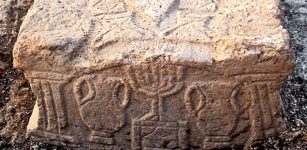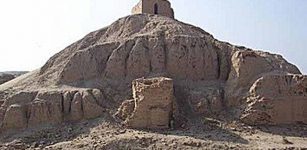The Word Salary Has Roots In Ancient Rome And History Of Salt
Ellen Lloyd - AncientPages.com - Have you ever wondered where the word salary comes from?
The word salary can be traced to ancient Rome and the history of salt. Salt was used as a trading medium just as money is used today. Ancient Roman warriors who served the empire received payment with a handful of salt each day. Roman historian Pliny the Elder, stated as an aside in his Natural History's discussion of seawater, that "In Rome. . .the soldier's pay was originally salt and the word salary derives from it.”
However, according to more modern sources, it is stated that although Roman soldiers were typically paid in coin, the word salarium is derived from the word sal (salt) because at some point a soldier's salary may have been an allowance for the purchase of salt the price of having soldiers conquer salt supplies and guard the Salt Roads (Via Salaria) that led to Rome.
See also:
Ancient Round Coins Were Invented To Prevent Fraud
Beer Was Used As Medicine And Payment In Ancient Egypt
What Was Legio Martia And Why Were The Roman Soldiers Called The Martians?
There are also some people who claim that the word soldier itself comes from the Latin sal dare (to give salt), but most historians disagree, noting that the word soldier more likely derives from the gold solidus, with which soldiers were known to have been paid.
When the term salarium entered into English it was modified to modern-day salary!
Written by - Ellen Lloyd - AncientPages.com
Copyright © AncientPages.com All rights reserved. This material may not be published, broadcast, rewritten or redistributed in whole or part without the express written permission of AncientPages.com
Expand for referencesMore From Ancient Pages
-
 Beautiful Legend Of The Christmas Rose – A Symbol Of Love And Hope
Christmas Traditions | Dec 26, 2024
Beautiful Legend Of The Christmas Rose – A Symbol Of Love And Hope
Christmas Traditions | Dec 26, 2024 -
 Cave Of The Stone Sepulcher – ‘Actun Tunichil Muknal’ And Its Dark History
Featured Stories | Mar 22, 2019
Cave Of The Stone Sepulcher – ‘Actun Tunichil Muknal’ And Its Dark History
Featured Stories | Mar 22, 2019 -
 Rare 2nd Temple-Era Etchings Of Menorah And Cross Discovered In The Judean Hills
Archaeology | Jan 8, 2017
Rare 2nd Temple-Era Etchings Of Menorah And Cross Discovered In The Judean Hills
Archaeology | Jan 8, 2017 -
 Tummal Inscription’ – Thirty-Two Lines Of Sumerian Document Popular In Babylonian Schools
Featured Stories | Apr 7, 2016
Tummal Inscription’ – Thirty-Two Lines Of Sumerian Document Popular In Babylonian Schools
Featured Stories | Apr 7, 2016 -
 Ancient Maps Reveal What Will Happen With Our Climate In The Future – Scientists Say
Archaeology | Oct 12, 2022
Ancient Maps Reveal What Will Happen With Our Climate In The Future – Scientists Say
Archaeology | Oct 12, 2022 -
 Evidence Europeans Used Slash-And-Burn Methods 9,500 Years Ago For Agriculture Purposes
Archaeology | May 18, 2022
Evidence Europeans Used Slash-And-Burn Methods 9,500 Years Ago For Agriculture Purposes
Archaeology | May 18, 2022 -
 Ancient Chaco Was Organized Society Ruled By Women, Study Suggests
Archaeology | Mar 6, 2017
Ancient Chaco Was Organized Society Ruled By Women, Study Suggests
Archaeology | Mar 6, 2017 -
 Ancient Maya Stela Carved On Both Sides Unearthed ‘In Situ’ In Uxmal, Yucatan Peninsula
Archaeology | Oct 31, 2022
Ancient Maya Stela Carved On Both Sides Unearthed ‘In Situ’ In Uxmal, Yucatan Peninsula
Archaeology | Oct 31, 2022 -
 Gate of Zeus Temple Is A New Discovery In Western Turkey
Archaeology | Sep 30, 2021
Gate of Zeus Temple Is A New Discovery In Western Turkey
Archaeology | Sep 30, 2021 -
 How Important Was Music In Ancient Egypt?
Ancient History Facts | Jan 16, 2021
How Important Was Music In Ancient Egypt?
Ancient History Facts | Jan 16, 2021 -
 Hedeby: Prestigious Trading Center And One Of The Largest Baltic Sea Ports In Viking Age
History | Jan 23, 2025
Hedeby: Prestigious Trading Center And One Of The Largest Baltic Sea Ports In Viking Age
History | Jan 23, 2025 -
 Extraordinary Bronze Age Jewelry Hoard Discovered In A Carrot Field In Switzerland
Archaeology | Oct 18, 2023
Extraordinary Bronze Age Jewelry Hoard Discovered In A Carrot Field In Switzerland
Archaeology | Oct 18, 2023 -
 Wolstenholme Towne: Lost Virginia Settlement – Destroyed, Abandoned And Forgotten
Featured Stories | Jun 26, 2018
Wolstenholme Towne: Lost Virginia Settlement – Destroyed, Abandoned And Forgotten
Featured Stories | Jun 26, 2018 -
 Homo Bodoensis Is A New Species Of Human Ancestors Who Lived Half A Million Years Ago
Archaeology | Nov 1, 2021
Homo Bodoensis Is A New Species Of Human Ancestors Who Lived Half A Million Years Ago
Archaeology | Nov 1, 2021 -
 Ancient Relief Depicting Heracles With His Crook And A Seven-Headed Snake Should Be Protected
Archaeology | Dec 14, 2015
Ancient Relief Depicting Heracles With His Crook And A Seven-Headed Snake Should Be Protected
Archaeology | Dec 14, 2015 -
 Legend Of Baku – The Dream Eater – Was It An Ancient Supernatural Being?
Featured Stories | Feb 15, 2023
Legend Of Baku – The Dream Eater – Was It An Ancient Supernatural Being?
Featured Stories | Feb 15, 2023 -
 Demon Oni: Cruel Harbinger Of Disease And Misfortune In Japanese Folklore
Featured Stories | Dec 2, 2019
Demon Oni: Cruel Harbinger Of Disease And Misfortune In Japanese Folklore
Featured Stories | Dec 2, 2019 -
 How And When Did Ancient People Start Using Oil?
Ancient History Facts | Jun 28, 2018
How And When Did Ancient People Start Using Oil?
Ancient History Facts | Jun 28, 2018 -
![Photo taken on Dec 20, 2015 shows hoof-shaped gold ware unearthed from the main coffin in the Haihunhou (Marquis of Haihun) cemetery, East China's Jiangxi province. [Photo/Xinhua]](https://www.ancientpages.com/wp-content/uploads/2015/12/MarquisofHaihuntomb1-307x150.jpg) Does A 2,000-Year-Old Tomb Belong To Marquis of Haihun? – Search For His Seal Continues
Archaeology | Dec 25, 2015
Does A 2,000-Year-Old Tomb Belong To Marquis of Haihun? – Search For His Seal Continues
Archaeology | Dec 25, 2015 -
 Unique Ancient Roman Winery With Marble Tiling And Fountains Of Grape Juice Unearthed In Rome
Archaeology | Apr 17, 2023
Unique Ancient Roman Winery With Marble Tiling And Fountains Of Grape Juice Unearthed In Rome
Archaeology | Apr 17, 2023

